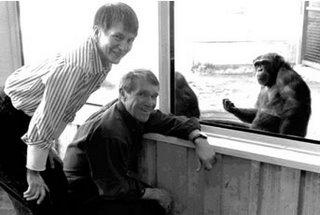This Week in Animal Rights: Some Victories Won While Some Still Need Fighting For--All of Them Are Being Questioned.
 Perhaps it is too easy to comment here on a blog entitled “California Conservatives: speaking out for the silent Majority.” However, it seems that it is just as easy to find needlessly angry liberals as it is to find needlessly angry republicans. On the other hand it is also quite possibly that a blog such as this is useless to comment on due to the bias that is not only used in this blog to communicate opinion but also used to communicate what are supposed to be the “facts.” Regardless, it was an interesting undertaking and good practice in attempting to communicate to someone who is only going to listen to me if I present my argument with a sense of inclusiveness. The fact that Spain is actually going to pass a law allowing great apes more rights is a huge deal in the eyes of myself and many others,
Perhaps it is too easy to comment here on a blog entitled “California Conservatives: speaking out for the silent Majority.” However, it seems that it is just as easy to find needlessly angry liberals as it is to find needlessly angry republicans. On the other hand it is also quite possibly that a blog such as this is useless to comment on due to the bias that is not only used in this blog to communicate opinion but also used to communicate what are supposed to be the “facts.” Regardless, it was an interesting undertaking and good practice in attempting to communicate to someone who is only going to listen to me if I present my argument with a sense of inclusiveness. The fact that Spain is actually going to pass a law allowing great apes more rights is a huge deal in the eyes of myself and many others,  as I have worked directly with Chimpanzees and hope to work in the future with many other primates. For decades people like Jane GoodallRoger and Debbie Fouts have been fighting to make the lives for captive chimpanzees and other primates better, considering the futility of trying to fight for there to be no primates in captivity at all. To think that finally somewhere there is a little ray of light breaking through is great. To think that anyone could misconstrue this rather benign law being passed as having a threat to the rights of human beings is laughable. Those issues are completely separate and it would be a shame if they were lumped together. The bottom line is, when people don't know the facts about great apes, they'll scoff at the notion of them having more rights. Hopefully, with some education, the laughter will stop. and
as I have worked directly with Chimpanzees and hope to work in the future with many other primates. For decades people like Jane GoodallRoger and Debbie Fouts have been fighting to make the lives for captive chimpanzees and other primates better, considering the futility of trying to fight for there to be no primates in captivity at all. To think that finally somewhere there is a little ray of light breaking through is great. To think that anyone could misconstrue this rather benign law being passed as having a threat to the rights of human beings is laughable. Those issues are completely separate and it would be a shame if they were lumped together. The bottom line is, when people don't know the facts about great apes, they'll scoff at the notion of them having more rights. Hopefully, with some education, the laughter will stop. and In a slightly different vain, very sane minded, animal loving people grow angrier and angrier by the actions of animal rights extremists, rightly so. However it seems a shame that because of these extremists who go to horrific violent acts, even those who are using less violent tactics are being written off as worthless human beings worthy of death or worse, worthy of being treated the way we treat animals. Posting a response here, was very important because it seems people are so quick to gloss over what is really going on, and jump to conclusions or gross overstatements that essentially
 throw away the validity of one persons life because they don't agree with that persons actions. The fact of the matter is it is very easy to be scared of people who seem to care enough about animals as to use the famous “holocaust” analogy. However, as much as I hate to say it, one of the definitions of the word reads as such: any mass slaughter or reckless destruction of life. Understandably used, but maybe not in the best taste. The point is it is very easy to think that animals are expendable, but it’s impossible to believe when you have actually had first hand experience with the type of emotions and intelligence an animal such as a chimpanzee is capable of. It’s jarringly familiar. They can communicate with us. Not many people realize what that means. I do not support acts of violence in the name of animal rights; I do not support the act of reducing the rights of humans in favor of rights for animals. However, revolution has never been a pretty thing. Maybe the three people who were sent to jail for harassment even deserve to be there. On the other hand, the amount of hatred that rises from people so uninvolved with these human's lives is quite unnerving. These are not people are trying to kill abortion doctors and restrict the lives of women. They are people are willing to go to jail, willing to test the limits of a corporation that is exploiting animal life to better our own. They are people testing what our systems of belief are really founded on. The reason why I posted my response was not because of what these activists did, that was not my mission here. My reason for posting was, instead to respond to the resounding response of other posters who had quite a bit of anti-animal sentiment as well as anti-human sentiment in regards to those who were sentanced. Quite frankly, I find this sad and hope to lend some helpful perspective to the matter.
throw away the validity of one persons life because they don't agree with that persons actions. The fact of the matter is it is very easy to be scared of people who seem to care enough about animals as to use the famous “holocaust” analogy. However, as much as I hate to say it, one of the definitions of the word reads as such: any mass slaughter or reckless destruction of life. Understandably used, but maybe not in the best taste. The point is it is very easy to think that animals are expendable, but it’s impossible to believe when you have actually had first hand experience with the type of emotions and intelligence an animal such as a chimpanzee is capable of. It’s jarringly familiar. They can communicate with us. Not many people realize what that means. I do not support acts of violence in the name of animal rights; I do not support the act of reducing the rights of humans in favor of rights for animals. However, revolution has never been a pretty thing. Maybe the three people who were sent to jail for harassment even deserve to be there. On the other hand, the amount of hatred that rises from people so uninvolved with these human's lives is quite unnerving. These are not people are trying to kill abortion doctors and restrict the lives of women. They are people are willing to go to jail, willing to test the limits of a corporation that is exploiting animal life to better our own. They are people testing what our systems of belief are really founded on. The reason why I posted my response was not because of what these activists did, that was not my mission here. My reason for posting was, instead to respond to the resounding response of other posters who had quite a bit of anti-animal sentiment as well as anti-human sentiment in regards to those who were sentanced. Quite frankly, I find this sad and hope to lend some helpful perspective to the matter."Only when we understand can we care, and only when we care sufficiently will we help"-Jane Goodall





